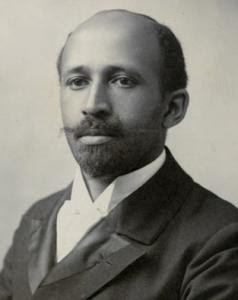U. Mass to Digitize W.E.B. Du Bois Archives

Peter Schworm writes in the April 4 issue of the Boston Globe that the University of Massachusetts W.E.B. Du Bois Library in Amherst plans to digitize its collection of the black scholar and activist's papers. More than 100,000 documents, from diaries, to photographs, to letters and speeches are being digitized and posted on the Internet for public access.
The papers, which include speeches and unpublished essays and other writings, will be converted to digital form and posted on the Internet in a two-year, $200,000 effort, the library announced yesterday. The project will allow unprecedented access to the extensive collection, recognized as the leading Du Bois anthology in the world.The article notes that the University of Massachusetts had no connection with Du Bois besides recognizing the historical importance of his papers. A former chancellor of the University, Randolph Bromery, persuaded Du Bois' widow to leave the papers to U. Mass by mentioning that Du Bois' childhood home in Great Barrington would be visible from the top floor of the library, if one could see through the Berkshire Mountains. Other, smaller, portions of Du Bois' papers are held by Fisk University, a historically black university in Tennessee which he attended, and by Clark University Atlanta, at which Du Bois taught, when it was called Atlanta University (Atlanta University merged with Clark University in 1988). The increased visibility and accessibility of the Du Bois papers is a wonderful thing!
"There is some wonderful stuff here, tremendous material that deserves a wider audience," said Rob Cox, head of special collections at the W.E.B. Du Bois Library. "Du Bois lived a huge swath of African-American history and American history, and can be accessed by anyone, anywhere."
Du Bois was born and grew up in Great Barrington, where his family was among the few black residents. He attended Harvard, where he became the first black to receive a doctoral degree. He would later famously remark about his time at Harvard - "I was in Harvard, but not of it." (snip)
The collection features letters between Du Bois, one of the founders of the National Association for the Advancement of Colored People in 1909, and such historical figures as Booker T. Washington, Marcus Garvey, Mohandas Gandhi, and Albert Einstein. It is used extensively by Du Bois scholars, who have primarily read the documents by microfilm. "We are constantly getting requests, from all over the world," Cox said.
Other highlights include a menu signed by a group of civil rights activists in 1905 at the first meeting of the Niagara Movement, the precursor organization to the NAACP. They met on the Canadian side of the Niagara River, in Ontario, because no restaurant in Buffalo would serve them. (snip)
The UMass effort is being financed through a grant from the Verizon Foundation, which funds scholarly programs that use technology.
Once scanned and cataloged, the collection will be searchable via the Internet.
About 75 percent of the archives are personal correspondence. The archives include drafts of articles, books, and plays.
The photograph of W.E.B. Du Bois above, is from the Globe article, where it is uncredited.
No comments:
Post a Comment